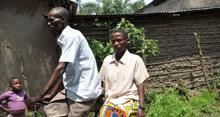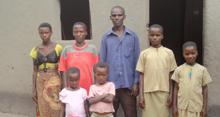Evolving Fatherhood
Big Ideas
Leading thinkers and activists share game-changing ideas about motherhood and improving maternal health and women's rights.

When thinking about fatherhood, I first think about the picture you see here. It shows my wife Duniska and I smiling and holding our brand new baby at the surgical table, right after his birth via caesarean section. This photo depicts one of the highlights of my life. The surgery went fine; we could only thank God and destiny for all the happiness shared in that very intimate moment.
I am a medical doctor and I worked for two years as a primary health care doctor in an extremely poor area in Peru, and four more years supervising maternal and child health providers in rural areas of Peru. I’ve attended more than 450 successful births. As a father and doctor, I am personally and professionally passionate about providing necessary healthcare for mothers because it’s one of the key ways to enhance our society. But in order for families to thrive, all fathers—from upper class to impoverished communities—need to better engage with birth and childrearing, starting with pregnancy, and policy makers must commit to providing better maternal healthcare to all communities.
I think about my wife’s labor, and then I think about the many women I have helped give birth in poor or rural areas in Peru. In an ideal world, class level would not affect something as essential and personal as giving birth, and yet, it does. I have seen first-hand the many differences in the birth experiences of indigenous women in Peru versus middle and upper class Peruvian women who give birth in cities. For example, when considering my wife’s labor, a similar birth in rural Peru to an impoverished mother might introduce one of many challenges.
First, there are the questions of accessibility: if the mother happened to need a caesarean section or c-section, the question of availability would be immediate. C-sections are only available at hospitals located in larger cities or capitals of provinces, many of which are as many as 14 hours away by car from the most remote rural areas (in the case of indigenous tribes in the Amazon, medical help is often days away). Additionally, the available staff is often overstretched, and has limited medical skills, leaving them unable to manage obstetric or neonatal emergencies.Beyond geographic accessibility, economic access would also be a barrier to many rural women. Most would not be able to afford the car ride that would take them to the hospital.
Another likely roadblock to a safe, happy birth experience is that respectful maternal care in indigenous areas is not always available. Whereas I was allowed by my wife’s side as our son was born, that was because she gave birth in a private hospital. Fathers are forbidden in the delivery rooms in all public hospitals. I remember from personal experience how scared and insecure many rural indigenous women in the Peruvian Andes seemed when, at public hospitals and health facilities, they were not allowed to have their partners with them as they gave birth.
For women living in a rural area, poverty and social status creates exclusion and limited health rights. An additional challenge is that many of the women giving birth are illiterate, and they often experience discrimination. As a result, women in rural or impoverished areas lose trust in health care workers, or are afraid to demand quality care
Many of these challenges are still “invisible” for many policy makers and influential groups in Peru. Inequalities within our country in terms of access to good quality public services and development opportunities are sound and stark. For us to make progress, policy makers need to recognize the significance of these issues. Women should be more aware of their rights of sexual, reproductive and maternal health and should have the opportunity to weigh in on how to improve these services. Fathers should also be more interested in the health of their wives and newborns, and get involved in finding solutions; as it stands, especially in the indigenous areas, maternal health is understood as "a women's issue," due in part to the culture of “machismo” that is still prevalent throughout the country.
It is not necessarily only a rural issue. Many times I have heard at the obstetric clinics “Congratulations! Here is your baby. You’re a father now.” That is not the case: fatherhood doesn’t begin with the baby’s arrival. Fatherhood begins the moment the couple confirms they are expecting. It is not only the woman who is expecting, but many men consider pregnancy purely a woman’s issue. It should be a matter of team work from the very beginning. Men should bear in mind that our bond with our future children begins during pregnancy.
I wonder how many future fathers think like that.. I still remember how I devoured books and magazines addressed to future mothers, where experts explained how best to prepare for the baby’s arrival. I wanted to be as helpful as possible in promoting a healthy pregnancy. . Moreover, I wanted to communicate with our baby, and let him know that a loving couple was enthusiastically waiting for his arrival. An interesting issue, however, was that all the books and magazines—along with almost all the advice we received from family and friends—were only addressed to future mothers. We need to focus on the fathers’ role, too.
Having said that, there are important changes happening among the young people of the Andes, likely due to increased access to education and information about gender equality and approaches to masculinity. Times are changing, and there is an increasing number of men who are also learning how to share this unique process with their wives or partners. More and more men are getting involved in ensuring their partner’s healthy pregnancy. Communities are more often pressing for public hospitals to allow the presence of the father at the moment of delivery.
Safe and respectful maternal healthcare not only brings happiness to our individual families, but it is a key driver of progress in our communities and society as a whole. Inadequate healthcare for new mothers and babies is one of the main injustices of the modern world, and a violation of the most essential of human rights. In order to bridge this gap, it is essential for policy makers to step forward, and for fathers to be partners in progress.
Related Content
|
In Burundi culture, gender roles are strictly defined. Women and mothers have little power in their marriages and communities. Learn how Hatungimana Sylvestre is working to change these norms. |
Father and author Jeremy Adam Smith describes how being a father has changed over the years and what we need to call into question in order to redefine fatherhood. |
With more men willing to take an active role as fathers, rather than just be the family breadwinner, it seems we’ve come a long way toward gender equality in parenting—or have we? |
This documentary follows a family in Hungary where the father stays home as caretaker and the mother is the primary breadwinner. |






